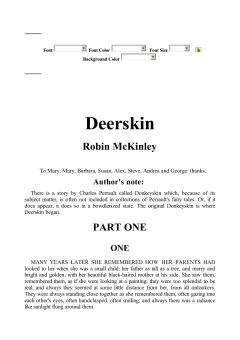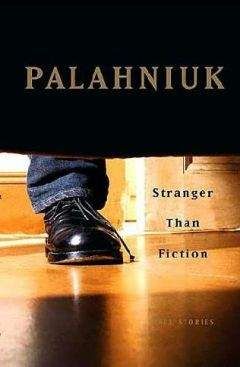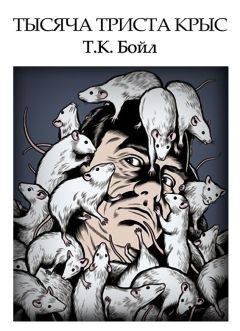Deerskin - Robin McKinley
На сайте mybooks.club вы можете бесплатно читать книги онлайн без регистрации, включая Deerskin - Robin McKinley. Жанр: Прочее издательство неизвестно,. Доступна полная версия книги с кратким содержанием для предварительного ознакомления, аннотацией (предисловием), рецензиями от других читателей и их экспертным мнением.
Кроме того, на сайте mybooks.club вы найдете множество новинок, которые стоит прочитать.

Deerskin - Robin McKinley краткое содержание
Robin McKinley читать онлайн бесплатно
It seemed the greatest luxury Lissar could imagine, a bath, hot water in a tub big enough to sit in, beside a hearth with a fire burning. She watched in a haze of happiness as the great kettle she had helped fill from a well-spout in the yard came to a slow Irickle of steam over the fire. She ate breakfast while the water heated; Ammy declared that she had eaten already, but she fried eggs and bread and slabs of smoked meat, and long thin spicy greens and short frilly mild ones, and Lissar ate it all. Ammy, watching her narrowly, then did it all over again. She had much experience of farm appetities, and Lissar ate like a harvester at the end of a long sennight. By the time Lissar had eaten her second enormous meal she had slowed down a good deal and Ammy did not threaten her with a third.
Ash, meanwhile, had swallowed three bowlsful-tureensful-of a mixture not wholly unlike what was more neatly arranged on Lissar's plate, and then flopped down where she was-in the middle of the floor, so that Ammy and Lissar then had constantly to step over her-and soon began snoring gently.
"And here is your bread," Ammy said, plunking down two great swollen loaves on the table that Lissar felt almost too full to push herself away from. She shook her head. "You made a very bad bargain. I will leave you both rabbits for breakfast alone."
"You may leave me both rabbits and I will make a stew which you may have some of for dinner or supper, after your bath and a nap. When you leave I will give you something to carry the bread in," said Ammy briskly.
There was enough room in the tub that with her knees drawn up Lissar could sink down till her whole head disappeared underwater. The water was so hot even her uncovered knees throbbed with it, and the feeling of the warmth beating against her closed eyes was delicious. She felt her skin relaxing, as if even the hairs on the backs of her arms, at the nape of her neck, had been on watch these long months past, and felt easy at last. She sat up again, partly to breathe, partly because her full stomach protested being folded up so snugly.
"You're as red as winter flannel," said Ammy, laying down towels. "I'll leave you alone now; soak as long as you like." But Lissar, leaning her head back against the lip of the tub, found herself growing uncomfortable. As her body relaxed, something that the tension of the long travel-stained weeks had held prisoner threatened to break out of its weakened bonds. A bath by the fire, she thought ... In the wintertime, her mind went on, slowly, when the big grand stone-walled bathroom was too cold.... The stone stood in tall narrow panels, black, white, black, all veined with gold and grey, and polished so smooth that fingers were briefly deluded into thinking it was soft.... What ... ? And, unbidden, the memory of a small round room came to her, its walls hung with tapestries and rose-colored silk, and a bath drawn up by the fire, and a table with a meal for one person and one dog stood beside it.
As she sat in the tub, the bed would be just behind her, there-She stood up and spun around, spraying the room with water. Ash, who had been struck in the face with a hot wet wave, opened one eye and registered a complaint; but Lissar was standing, staring at nothing-nothing but a table with shelves beyond it bearing ordinary kitchen things, bowls, plates, a spare pot, a cleaver, a grinder, several spoons-and shivering as if she stood naked in a blizzard.
Slowly she recollected herself, turned her head to where the door into the garden did not stand in this other room, and slowly this other room re-formed itself around her, becoming lower, longer, rectangular, plainer. Slowest of all she sat down again. I have given you the gift of time, the Lady said.
The little round room vanished, along with whatever other memory it might have given her; but it left a shadow, and Lissar's bath was spoiled. She soaped herself thoroughly, particularly relishing working it into her long white hair, and then rinsed, and stepped out of the bath at once. She bailed enough of the water into the channel in the corner that would carry it outdoors that she could tip the bath up on one end and empty it.
Ammy, in the kitchen garden, was surprised to see her so soon. She stood up, her apron full of weeds. "Would you like to sleep now? We've a spare mattress in the attic. I haven't made it up yet, but we can do that now."
Lissar shook her head. She was tired, her feet did not wish to move, and her stomach did not wish them to move either because it was still concentrating on digestion; but she was anxious, restless and fidgety now, and there was something wrong with the shape of the homely, welcoming kitchen, and knew that she would not lie easily on a mattress on the floor above it.
"What's the matter?" said Ammy quickly, having forgotten, for the moment, that she was a little in awe of her visitor, that the sadness in her face seemed an acceptable excuse for not offering any name to her host. Courtesy prevented Ammy from asking; but there was no harm in noting none given. Ammy saw in her face now that some old pain or fear had risen somehow, suddenly, to the surface; and Ammy had raised eight children and loved them all, and missed having them around now that they were grown and gone. "You-you look like you've seen a dragon." She knew that was not what she meant, but knew that she dared not say what she did mean. She reached out to touch Lissar's arm and then paused at the last moment and did not. Lissar was not one of her own daughters, after all, and it seemed too much a familiarity to this young white-haired woman with the black eyes full of grief and secrets.
Lissar smiled faintly. "We did once, up in the mountains." All of Ammy's first thoughts about the identity of this woman came rushing back. Very few people walked away from a solitary encounter with a dragon. "What happened?"
"We ran-and it wasn't very hungry."
Ammy stood looking at her guest for a moment, and then said, shrewdly, but in her early hesitating manner, still thinking about the dragon: "Would you be more comfortable sleeping in the barn? The hay's still sweet and dry, not at all musty; Barley turns it so it will stay good."
It was Lissar's turn to look at the other woman in surprise. "Yes ... I think I would. I thank you. That's very ... thoughtful." She touched her grateful stomach. "I would rather sleep than go on walking."
"Do you-know your direction?" said Ammy cautiously, a little afraid that Lissar might read Where are you from? and Where are you going? plain in her eyes.
"How far is the city?" said Lissar.
"The city?" Ammy said, frowning. "Do you mean the king's city?"
The king's city. The king's city. Was this what she wanted? Did she know her direction? She wished again for the breath of direction against her cheek, that she had not felt since she first saw the road; and the voice from the mountaintop was silent. "Yes," she said.
"It's a way," said Ammy doubtfully. "I've not been there. Barley was, once, when he was a young man; the roads are better now." Ammy added, allowing herself a twinkle, "If you stay for supper you can ask him about it."
Lissar smiled, and felt her face muscles awkward again in the gesture. "Oh," she said with a sigh, as what felt like several months' exhaustion fell on her all at once; "I do feel I could sleep till suppertime twice over." She thought: No wonder wild animals live such short lives. This is what it feels like, never being quite sure that that crackle in the underbrush isn't something that wants to eat you. She felt suddenly unable to bear all that watchfulness.
Ammy said: "Stew only gets better for waiting. I'll keep you some for tomorrow night, if you oversleep."
At that Lissar laughed out loud; and the sound frightened her in the first moment that it broke out of her. Ammy saw the fear, and her friendly heart was shaken by the knowledge that any human creature could fear her own laughter. Without time for thought she reached out and took both Lissar's hands in hers, and said, "My dear. . .
Lissar grasped those hands firmly for a moment, and they stood in silence. "I have been, perhaps, too long in the mountains," she said quietly. And then Ammy took her out to the barn, and Lissar and Ash burrowed deep in the clean sweet-smelling hay and were asleep before Ammy finished pulling the heavy door shut behind her.
But the habits of the last months were still strong in Lissar; furthermore all the noises she heard here were unfamiliar and therefore suspicious. She half-woke when the rooster crowed, which he did at intervals, without any reference to the position of the sun in the sky; half-woke when Ammy went in and out of the house-door, when she called the chickens for their food, when she answered a friend's greeting from the road. The farm dog barked once, perhaps at some whiff of Ash's presence; Ash bristled and growled briefly in her sleep.
One noise in particular disturbed her, dredged her up farther than half-sleep, almost to waking, till she recognized it: the crunch and creak of wagon wheels. She had not heard that sound for a long time, and its echoes rang off other memories she did not want disturbed. She dozed and drifted, and then came fully awake on the instant when Barley came home and entered the barn to hang up his mended tool.
She slid down from her crackly perch, pulling hay-stems from the neck of her dress. "Ah," said Barley. "Ammy said you were here." He was smiling at her, but there was a puzzlement, almost a wistfulness, in his eyes similar to the way his wife had looked at her. "I thought perhaps you would have slipped out the back way and gone on-to save the trouble of talking to them old folks again. Old folks can be real meddlesome."
She surprised herself by saying almost angrily, "I would not have left without saying good-bye. I am grateful for your help and kindness and welcome. I do not see you as meddling."
The half-anxious, half-curious look faded, and he said, "Never mind me. Ammy's always telling me I talk before I think. Since you're awake now, come in for supper-it's rabbit stew. Isn't that something?"
The stew was better than anything Lissar had made last winter in their hut; the onions and herbs were fresh, and obviously added by a hand that knew what it was doing. They ate by firelight; Lissar listened to Barley's story of his day's adventure without paying attention to the meaning of the words. It was fascinating to her merely to hear language spoken again, to listen to the rise and fall of a voice speaking intelligibly, hands gesturing now and then to support or illustrate a point. It did not matter what the point was. It was enough-more than enough-that this sort of communication went on; that there were sounds that were not creaks in the bushes, however meaningful, or the fussing of chickens, however meaningless. She noticed that Barley used a word now and then that was unknown to her, but she felt no desire to ask him to explain, whether from a gentle indifference to unnecessary particulars, or from a fear of exposing too much of the extent of her own strangeness, she did not know.
She came back to full attention when Ammy said, "Our guest was asking about the yellow city-how far it is. I couldn't tell her."
"The yellow city?" said Barley. And he repeated what his wife had said earlier:
"The king's city?" And again the word king made Lissar want to look behind her, throw pebbles in the shadows to see what would be flushed out.
Barley ran his hand over his head. "I haven't been there in thirty years. There isn't enough grass there, and too many people, and the vegetables ain't really fresh, even in summer. What do you want with the city?-Wait," he added hastily, "I'm not asking, it's just my way of talking. I ain't used to anybody who ain't used to me. It took us, well, near a month to get there; but the wheel-horse threw a shoe and went lame with it, and we lost a few days. The roads are better now; it's one of Cofta's pet projects, the road system."
"Cofta?" said Lissar before she thought to stop herself.
The other two stared at her. "King Cofta," Barley said, after a moment. "It's his city you're wanting." Lissar looked up from the table, through the unshuttered window, where sunset still kept the darkness at bay. The entire world was rose-colored with this day's end, the same rose color as the hangings of a small round room.
"Ah, well," Barley went on, "both of us know from listening to you that you ain't from around here." The pause this time was anxious, trying not to be expectant and failing.
"No," said Lissar. "I'm from ... a place beyond the mountains."
Barley hastened into the pause that followed this statement. "You might never have heard of our king as Cofta anyway, for he's King Goldhouse the Seventeenth; but they've all been Goldhouses, all seventeen of them in a row, and Ossin will be Goldhouse the Eighteenth when his time comes.
"Their great house is yellow brick, and the door is covered with gold leaf, and the creatures carved into the arch of it have golden claws and eyes and tail-tips. Most of the town is built of the same brick, so it's called the yellow city, although there ain't any other gold except the door-handle of the guild hall, where there's always a doorkeeper, just like at the king's door."
Lissar declined her hosts' repeated offer of the mattress, or a return to the warm haystack. She was tempted, for the weariness the bath had awoken deep in her bones was still strong. But she felt that she had lost the knack for sleeping under a roof, and that, now she knew the name of the place she had chosen as her goalthe king's city, the yellow city-she wanted to keep on toward it as steadily as she could.
"Come see us if you come back this way," Ammy said hopefully.
"I will," Lissar said, surprising herself by meaning it.
It was full dark as she and Ash stepped onto the road again-with two loaves of bread, tied up in a kerchief, under one arm, for Ammy had won that argument-and fell into their familiar loping pace, Ash silent at her left side. The weariness, strangely, dropped from her as they ran, as she breathed deeply of the cool night air.
Похожие книги на "Robin McKinley", Deerskin
Deerskin читать все книги автора по порядку
Deerskin - все книги автора в одном месте читать по порядку полные версии на сайте онлайн библиотеки mybooks.club.




